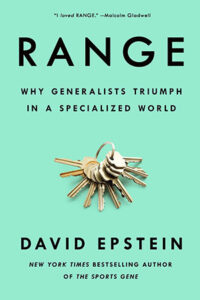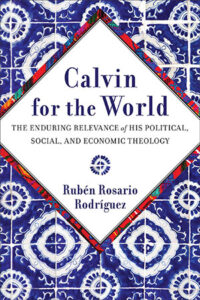Matt’s Shelf

Range:
Why Generalists Triumph in a Specialized World
by David Epstein
In a world that emphasizes specialization as the surest path to success, parents can feel pressure to guide their children to specialize too early. This quest is shaped in part by the fabled 10,000 hour rule, which says we must compile that much practice time in any endeavor to become proficient. Not so, says Epstein. Instead, the general, winding path can have surprising benefits, and may actually provide individuals a leg up in many fields.

Calvin for the World:
The Enduring Relevance of His Political, Social, and Economic Theology
by Ruben Rosario Rodriguez
Rodriguez thinks Calvin’s critics have got him wrong. Though his legacy is complicated, Rodriguez agrees with Marilynne Robinson’s quip, “Calvin has a strange reputation that is based very solidly on the fact that nobody reads him.” This book introduces readers to a multidimensional Calvin, and the substantive ideas that guided his teaching and approach to public life.
The renowned 20th-century inventor Charles Kettering once remarked, “My interest is in the future because I am going to spend the rest of my life there.” While some people prefer to reflect on the past, and others are engaged in the present, I deeply resonate with Kettering’s proclivity to wonder about what is to come.
I believe this to be an accident of my temperament more than a virtue or vice. Still, I’ve always been fascinated by the future, especially when it concerns emerging technologies that may lead to human flourishing.
Take energy, for example. As resource limitations and environmental impact dominate the public conversation, I’ve been riveted by those who speak optimistically about the potential of fusion energy. The opposite of fission, fusion is the mind-boggling energy source that keeps our sun burning, when two atoms, amidst temperatures approaching 150 million degrees Celsius, fuse together and emit enormous amounts of energy.
Though we are likely decades away from realizing fusion’s potential, I listen with fascination to futurists who speak as if fusion’s promise will certainly be realized and with it the potential of a clean, limitless source of energy.
Or take medicine. The innovations of the past 25 years, including mapping the human genome, increasing understanding of RNA, gene editing, antibody drug conjugates in oncology, and diagnostic advances, mean there is hope for addressing a range of diseases that were once incurable. There are still far too many maladies that have brutal outcomes. But in the next 25 years, AI and ongoing advances could greatly accelerate the discovery and development of novel medical therapies for some of the deadliest diseases.
Charles Kettering was on to something: The future is a thrilling place, and the good news is there is much to be hopeful for.
And yet, I shouldn’t be naive. The Enlightenment assurance that progress will inevitably march on in the future has not always ended well. While the overall trendline is unmistakably positive, devastating consequences have followed hubristic promises. In the now well-worn example, we all remember how the early creators of social media promised unvarnished good. Most now see a darker reality. Future advances of all kinds may do as much harm as good, and the more powerful they are, the more their impact, for good or bad, is multiplied.
This makes me think about Genesis 2:15, that first commission God gave to his image bearers: “Then the Lord God took the man and put him into the garden of Eden to cultivate it and keep it.” God intended a delicate balance in that first calling — that we would cultivate the raw, unexplored potential of his creation, while at the same time serving as diligent guardians of his world.
Had there been no fall, humans would have cultivated and kept in perfect balance, never creating anything that would have caused harm to ourselves, each other, or the environment. Progress in each successive moment would have resulted in a world always helped, and never harmed, in an ever-increasing cycle of flourishing.
But we live east of Eden. Now, all of our cultivating is marred by sin, but so is all of our guarding. On one hand, there is myopic failure to see the harm a new technology can create, and on the other, a failure to see how a needless roadblock can delay or negate human benefit.
The housing development debacles in California are a case in point. For decades, developers too often ignored the environmental implications of their building. But new regulations were misused to prevent housing from being built, giving unchecked power to any homeowners association wanting to effectively kill a multifamily project.
Meanwhile, the housing shortage crisis is wreaking havoc on home affordability in the state, and the poor bear the penalty. Cultivating and keeping have both gone horribly wrong. This is not the future we wanted.
In God’s design, we can’t get around it — cultivation and guarding belong together. Christ followers who peer into the future at innovations like AI must wisely cultivate the potential of the tools, with an ever-present eye toward guarding all that might contradict God’s design for image bearing.
In humility we must admit, our best efforts at working for a better world are only foretastes of an ultimate future. And what is our future destiny? I think Dallas Willard was right: “We should think of our destiny as being absorbed in a tremendously creative team effort, with unimaginably splendid leadership, on an inconceivably vast plane of activity, with ever more comprehensive cycles of productivity and enjoyment.”
Sounds like paradise. That is a future we can all look forward to.





